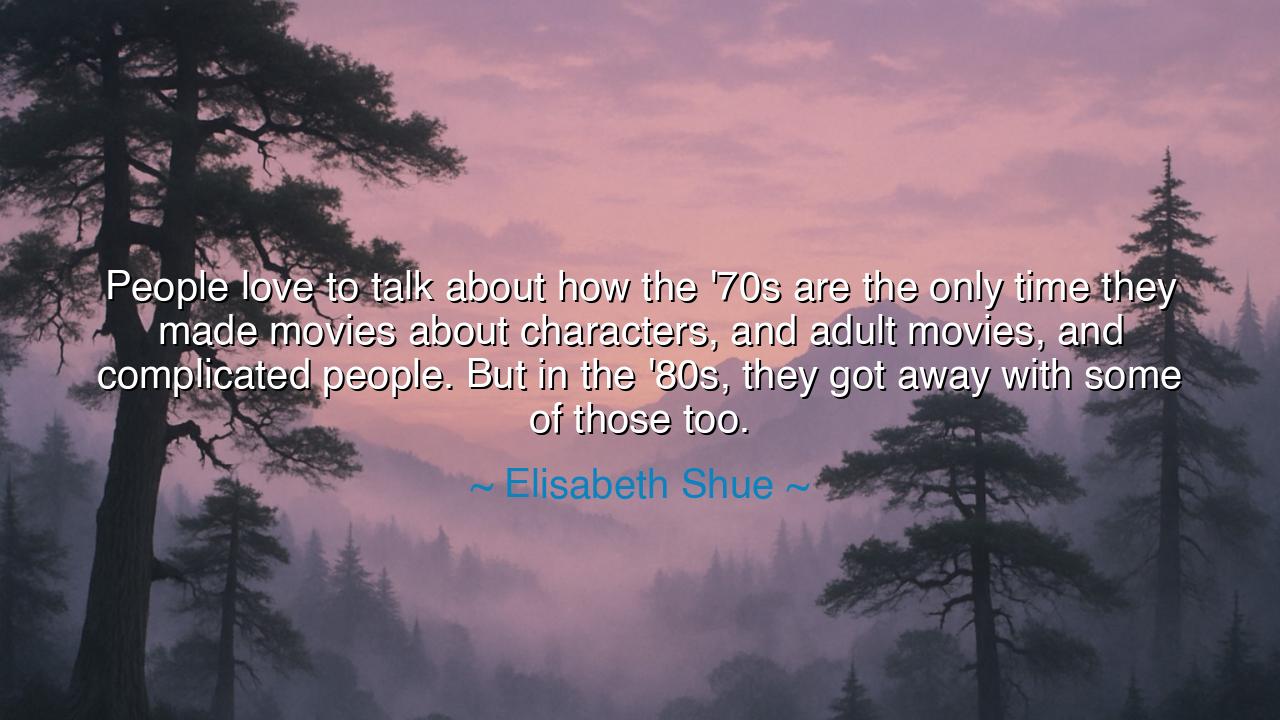
People love to talk about how the '70s are the only time they
People love to talk about how the '70s are the only time they made movies about characters, and adult movies, and complicated people. But in the '80s, they got away with some of those too.






Elisabeth Shue, in her reflective wisdom, offers a statement that resonates deeply with those who understand the rhythms of time and culture: "People love to talk about how the '70s are the only time they made movies about characters, and adult movies, and complicated people. But in the '80s, they got away with some of those too." In these words, Shue reflects on the evolution of cinema, recognizing how the complexity of storytelling ebbed and flowed with the changing tides of culture and society. What is most profound in her statement is the acknowledgment that storytelling, at its core, is always about human complexity—and that complexity can thrive in any era, even when it seems hidden beneath the surface of more commercial or mainstream works.
The 1970s are often hailed as a golden era in cinema, an age where movies dared to explore the depth of human emotion and psychology. The films of this era, such as "Taxi Driver" or "One Flew Over the Cuckoo's Nest", painted portraits of complicated people wrestling with the darkness of their souls, the strangeness of society, and the brutal realities of life. In these films, the character was not merely a vessel for plot; they were the plot itself. These stories were fraught with moral ambiguity and raw truth, representing a shift from the heroic and simplistic narratives that had dominated previous decades. The 70s filmmakers recognized that to understand the human experience, one must peer deeply into its imperfections.
Yet, as Shue wisely points out, the complexity of the human condition was not solely the domain of the '70s. The 1980s, often associated with excess and surface-level storytelling, also gave rise to movies that grappled with complex characters, albeit in a different way. While the era was dominated by more commercialized films—blockbusters and action heroes like those portrayed by Arnold Schwarzenegger and Sylvester Stallone—there was also a parallel shift. Films like "The Breakfast Club" and "Rain Man" took characters who might have once been seen as mere stereotypes and transformed them into multi-dimensional beings. In these films, the marginalized and the misunderstood found a voice, and in doing so, the very fabric of the 1980s cinema began to reflect the same intricacy and depth that had made the previous decade so powerful.
This is not unlike the history of the great philosophers. In ancient Greece, the Sophists sought to understand humanity not in its idealized form but in its flawed and diverse nature. They argued that the truth of human existence lay not in the pursuit of abstract ideals but in the complexity of individual experience. Like the films of the '70s and '80s, the Sophists understood that human beings are not one-dimensional creatures; we are all a mixture of light and shadow, good and bad, noble and flawed. Thus, just as the Greeks sought to understand the full spectrum of human nature, so too did filmmakers in the '70s and '80s seek to explore characters in all their complexity, with no easy answers to be found.
Moreover, the 80s filmmakers succeeded in finding a balance between the more commercial elements of cinema and the deeper exploration of character. The success of films like "Stand by Me" or "Tootsie" proves that, even in a time when the commercial imperative of cinema was at its peak, there was still space for the portrayal of real, nuanced human beings. These films, though often overlooked in favor of their bigger, more bombastic counterparts, demonstrate that complexity can exist even in the most unlikely places. Just as ancient rulers found ways to govern vast empires with a balance of strength and wisdom, so too did the directors of the '80s navigate the delicate art of storytelling, bringing depth to their characters while still appealing to a broad audience.
Shue's words hold a lesson for all creators, regardless of medium: the true power of storytelling lies in complexity. Whether in the rough, gritty dramas of the 1970s or the layered, often overlooked films of the 1980s, the human condition is best understood not through simple plots or idealized figures, but through the full range of human experience. We, too, must not shy away from the complicated or the difficult, for it is in grappling with the messiness of life that we discover its true beauty. The stories we tell, whether in film, in writing, or in our daily interactions, must embrace the fullness of our humanity. Only then can we begin to understand and appreciate the richness of our lives.
Thus, the call to action is clear: do not be afraid of complexity, whether in your creative endeavors or in the way you view the world. Seek out the deeper, more nuanced truths in every person, every situation, and every story. Understand that it is in imperfection and struggle that we find the heart of what it means to be human. Whether in the bold dramas of the past or the simple moments of today, complexity is where the soul of storytelling truly resides.






AAdministratorAdministrator
Welcome, honored guests. Please leave a comment, we will respond soon